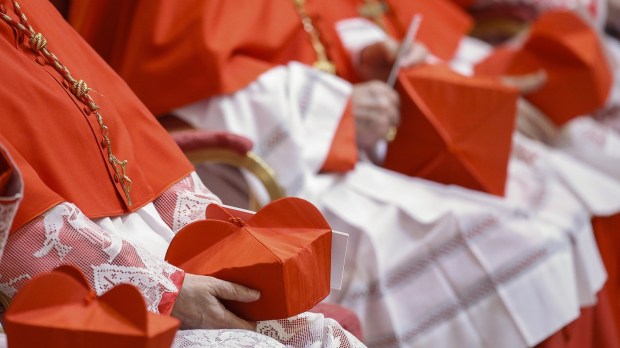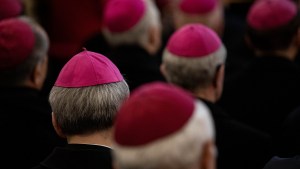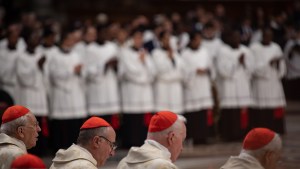Two Curia officials, two bishops serving in Latin America, and two prelates over 80 — a bishop emeritus and a 96-year-old simple confessor — are among the list of new cardinals to be created on September 30, 2023. Half of these new cardinals from the Americas are from Pope Francis’ homeland of Argentina.
Archbishop Robert Francis Prevost, the new American prefect of the Dicastery for Bishops
The 67-year-old Augustinian, formerly bishop of Chiclayo, Peru, succeeded Cardinal Marc Ouellet as Prefect of the Dicastery for Bishops on April 12. Pope Francis chose an atypical and unexpected profile in calling a religious missionary to head this powerful dicastery responsible for selecting bishops from territories of historic Christianity.
Born in Chicago on September 14, 1955, Archbishop Robert Francis Prevost comes from a family of French, Italian, and Spanish descent. After studying mathematics and philosophy at Villanova University in Philadelphia, he entered the Augustinian novitiate in 1977. He was ordained to the priesthood in 1982 in Rome. He spent much of his missionary life in Peru, before becoming Prior General of the Order of St. Augustine. He held that office for two six-year terms, from 2001 to 2013. He was then called to the episcopate by Pope Francis in November 2014, returning to Peru, his missionary homeland in the 1980s-90s.
Initially Apostolic Administrator of the Diocese of Chiclayo, he became its full Bishop in September 2015. Prevost was also Apostolic Administrator of the Diocese of Callao, the major Pacific port, from 2020 to 2021.
Archbishop Víctor Manuel Fernández, the pope’s friend and young prefect of the dicastery for the Doctrine of the Faith
The announcement of the new DDF prefect’s promotion to the cardinalate comes just a week after his appointment. He’s due to take up his new post in mid-September. This Argentinian theologian, who is very close to the Pontiff, has been archbishop of La Plata since 2018. He previously served as rector of the Pontifical University of Buenos Aires. He’s considered one of the authors of the apostolic exhortation Amoris laetitia, published following the 2014 and 2015 Synod of Bishops on the family, in which he participated.
Fernández was born in 1962 and ordained in 1986 for the Diocese of Villa de la Concepción del Río Cuarto. He studied biblical theology at the Pontifical Gregorian University in Rome, then held a number of parish and theological teaching posts. He is the author of numerous publications, translated into various languages, on biblical themes and human issues.
His appointment as head of this dicastery has given rise to considerable controversy. In a book published earlier this year, the former prefect for the Doctrine of the Faith, Cardinal Gerhard Ludwig Müller, who was dismissed in 2017, listed Archbishop Fernández among his detractors.
The Argentine theologian spoke in an interview with Corriere della Sera, published on May 10, 2015, about the Church: “the Church is the People of God guided by its pastors,” and that what is essential, therefore, are “the pope and the bishops.”
Archbishop Ángel Sixto Rossi, another Argentine Jesuit
The Argentine archbishop, who turns 65 on August 11, is close to Pope Francis. Not only do they share their nationality, but he is also a member of the Society of Jesus, for which he was ordained a priest in 1986. After studying in Ecuador, he defended a thesis on spiritual discernment in Saint Ignatius at Rome’s Gregorian University.
His activity within the Society of Jesus was marked in particular by his social commitment. In Buenos Aires, he founded “St. Joseph’s Home” (“Hogar San José”), which helps homeless people, and in 1992 he founded the Open Hands (“Manos abiertas”) Foundation, which provides assistance to the poorest and most vulnerable people in 10 Argentine cities.
Like the then Fr. Jorge Bergoglio, he was also a popular retreat preacher for his presentation of the Spiritual Exercises to groups of priests, religious, and lay people. The Pope called him to the episcopate in 2021 to take over the reins of the Cordoba Diocese, which has some 2.3 million inhabitants, served by around 300 priests.
Archbishop Luis José Rueda Aparicio, a cardinal for Bogotá
With this 61-year-old Colombian archbishop, Pope Francis honors the head of what is traditionally a cardinal’s see. The Diocese of Bogotá has a population of almost five million, served by some 1,000 priests (including 400 diocesan priests and 600 religious). It’s the primatial see of the Church in Colombia, which is deeply involved in the delicate peace process between the government and guerrilla movements.
Archbishop Rueda Aparicio was born in 1962 and ordained priest in 1989 for the Diocese of Socorro y San Gil. He was trained in moral theology at the Alphonsian Academy in Rome. After several parish and educational posts, including rector of a technical institute for rural development, he was appointed by Benedict XVI as bishop of Montelibano in 2012. Later, he was promoted by Francis to be the Archbishop of Popayán in 2018 and then of Bogotá in 2020. Installed in this position in the difficult context of the COVID-19 pandemic, he was also elected president of the Colombian Bishops’ Conference in 2021.
Non-voters:
Diego Rafael Padrón Sánchez, Archbishop Emeritus of Cumaná (Venezuela)
As president of the Venezuelan Bishops’ Conference from 2012 to 2018, this 84-year-old Venezuelan archbishop embodied the local Church’s resistance to the abuse of power by Nicolas Maduro’s populist left-wing regime. In particular, he worked closely with Archbishop Pietro Parolin, nuncio to Venezuela from 2009 to 2013, before Parolin was called to Rome as Secretary of State of the Holy See.
Father Luis Pascual Dri, OFM Cap., confessor at the Shrine of Our Lady of Pompei (Argentina).
The 96-year-old Argentinian Capuchin friar, born on April 17, 1927 (one day after Joseph Ratzinger), is the big surprise on the list of new cardinals. A simple confessor at the shrine of Our Lady of Pompeii in Buenos Aires, he knew Padre Pio personally. He has often been cited by Pope Francis as a model of the merciful priest, whose only scruple could be to have “forgiven too much.”



